2018高考英语语法复习八:动词时态和语态 16开
- 格式:doc
- 大小:58.50 KB
- 文档页数:8


语法复习讲练八:动词时态与语态(1)一、动词的分类和形式:动词是表示动作和状态的词。
动词有时态、语态和语气3种形式的变化。
1、动词按其能否独立作谓语而分为:“谓语动词”和“非谓语动词”两种2、动词的4种基本形式:动词原形、过去式、过去分词和现在分词。
3、动词按其构成动词词组作用分为:实义动词、连系动词、情态动词和助动词。
1)实义动词分为及物动词和不及物动词。
还可分为持续性动词和瞬间动词;2)连系动词有两种:一种表特征或状态,另一种表状态变化过程。
4、五种不同的短语动词:1)“动词+介词”;2)“动词+副词”;3)“动词+副词+介词”;4)“动词+名词(或代词)+介词”;5)“be+形容词(包括相当于形容词的过去分词+介词”。
二、动词的时态:1、一般现在时的用法:1)表示现在的习惯,经常发生的动作或存在的状态。
2)表示主语的特征、性格和能力。
3)表示客观事实或真理。
4)表示按照计划安排好的将来行为。
(只限于是go,come, leave, start, stop, be等开始或移动意义的词。
)2、一般过去时的用法:1)表示过去的动作或状态。
2)叙述过去连续发生的事情。
3)表示过去一段时间内经常发生的动作。
3、一般将来时的用法:1)表示将来的动作或状态。
2)表示将来的经常动作。
4、现在进行时的用法:1)表示说话时正在进行的动作。
2)表示现阶段正在进行的动作。
(说话时动作不一定进行。
)5、过去进行进的用法:1)过去某一时刻或某一段时间内正在进行的动作。
2)表示移动的动词:come, start, stay, leave, go等词的过去进行时可以表示过去的将来要发生的动作。
3)was going to do可以表示在过去某一时间之后发生的动作。
6、现在完成时的用法:1)表示刚刚完成的动作,常与just连用。
2)表示过去发生而持续到现在的动作或状态,甚至延续到将来。
常与since, for连用,但for, since不能与终止性的动词连用。
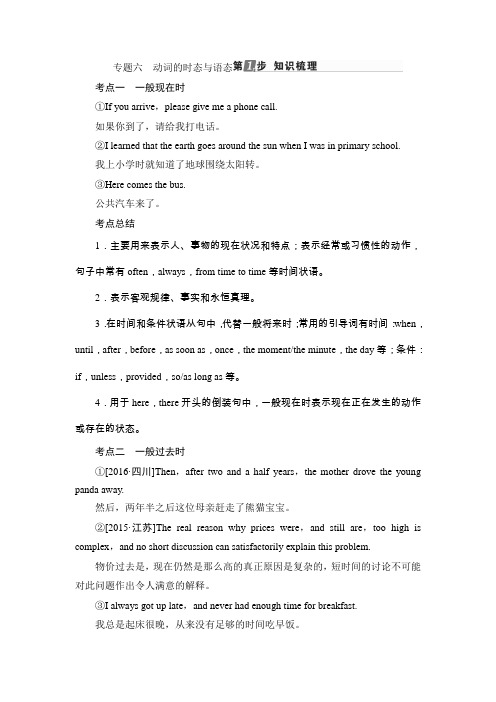
专题六动词的时态与语态考点一一般现在时①If you arrive,please give me a phone call.如果你到了,请给我打电话。
②I learned that the earth goes around the sun when I was in primary school.我上小学时就知道了地球围绕太阳转。
③Here comes the bus.公共汽车来了。
考点总结1.主要用来表示人、事物的现在状况和特点;表示经常或习惯性的动作,句子中常有often,always,from time to time等时间状语。
2.表示客观规律、事实和永恒真理。
3.在时间和条件状语从句中,代替一般将来时;常用的引导词有时间:when,until,after,before,as soon as,once,the moment/the minute,the day等;条件:if,unless,provided,so/as long as等。
4.用于here,there开头的倒装句中,一般现在时表示现在正在发生的动作或存在的状态。
考点二一般过去时①[2016·四川]Then,after two and a half years,the mother drove the young panda away.然后,两年半之后这位母亲赶走了熊猫宝宝。
②[2015·江苏]The real reason why prices were,and still are,too high is complex,and no short discussion can satisfactorily explain this problem.物价过去是,现在仍然是那么高的真正原因是复杂的,短时间的讨论不可能对此问题作出令人满意的解释。
③I always got up late,and never had enough time for breakfast.我总是起床很晚,从来没有足够的时间吃早饭。
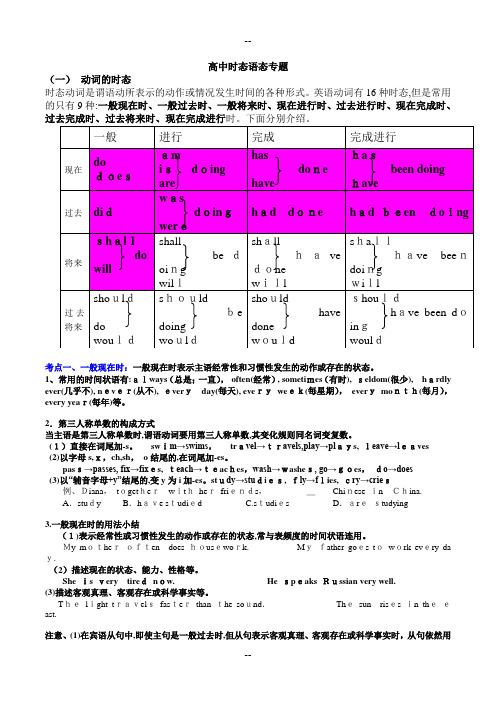
高中时态语态专题(一)动词的时态时态动词是谓语动所表示的动作或情况发生时间的各种形式。
英语动词有16种时态,但是常用的只有9种:一般现在时、一般过去时、一般将来时、现在进行时、过去进行时、现在完成时、考点一、一般现在时:一般现在时表示主语经常性和习惯性发生的动作或存在的状态。
1、常用的时间状语有:always(总是;一直),often(经常), sometimes(有时), seldom(很少),hardly ever(几乎不), never(从不), everyday(每天), everyweek(每星期),everymonth(每月),every year(每年)等。
2.第三人称单数的构成方式当主语是第三人称单数时,谓语动词要用第三人称单数,其变化规则同名词变复数。
(1)直接在词尾加-s。
swim→swims,travel→travels,play→plays, leave→leaves (2)以字母s,x,ch,sh,o结尾的,在词尾加-es。
pass→passes, fix→fixes, teach→teaches,wash→washes, go→goes,do→does(3)以“辅音字母+y”结尾的,变y为i加-es。
study→studies, fly→flies, cry→cries例、Diana,togetherwithherfriends,__________ Chinese inChina.A.study B.have studied C.studies D.arestudying3.一般现在时的用法小结(1)表示经常性或习惯性发生的动作或存在的状态,常与表频度的时间状语连用。
My motheroften does housework. Myfather goes towork every da y.(2)描述现在的状态、能力、性格等。
She is very tirednow. He speaks Russian very well.(3)描述客观真理、客观存在或科学事实等。
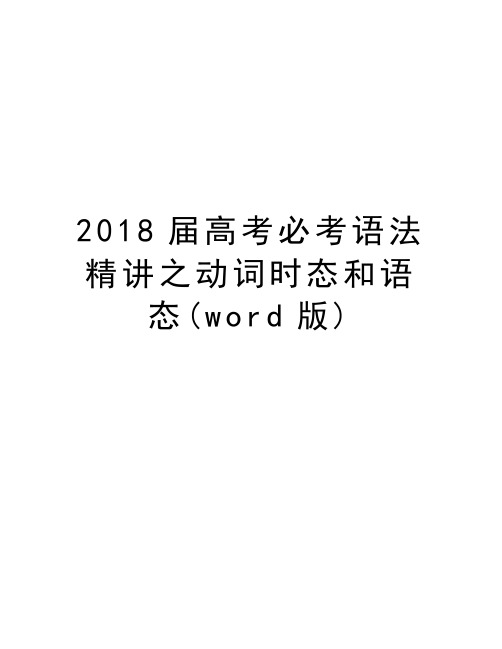
2018届高考必考语法精讲之动词时态和语态(w o r d版)精品文档2018 届高考必考语法精讲:动词的时态和语态语法中的时态(tense)是一种动词形式,同一动词的不同变化形式表达不同的时态,英语中有16 种时态。
《2017年普通高等学校招生全国统一考试大纲》附录语法项目表中对于时态列了十项:(1)一般现在时(2)一般过去时(3)一般将来时(4)现在进行时(5)过去进行时(6)过去将来时(7)将来进行时(8)现在完成时(9)过去完成时(10)现在完成进行时;此外还列了被动语态,并将其作为单独一项。
2015 年高考全国卷Ⅰ第61 题(语法填空)考查了动词arrive 的一般过去时arrived;第71 题(短文改错)考查了think 变为过去时thought;第75 题(短文改错)考查了被动语态,删掉been;第79 题(短文改错)考查了将动词过去时的found 变为现在时的find。
2016 年高考全国卷Ⅰ第62 题(语法填空)考查了allow 的一般过去时的被动语态was allowed;第74 题(短文改错)考查了将过去时had 变为现在时的have;77 题(短文改错)考查了将using 变为被动used。
2017 年高考全国卷Ⅰ第64 题(语法填空)考查了remove 的一般现在时的被动语态are removed;第74 题(短文改错)考查了将动词goes 变成一般过去时went。
各种时态构成表:(以do 为例)一般时态进行时态完成时态完成进行时态现在do/does is/am/are doing has/have done has/have been doing过去did was /were doing had done had been doing将来shall/will do shall/will be doing shall/will have done shall/will have been doing过去将来would do would be doing would have done would have been doing一、一般现在时:动词原形或第三人称单数1.构成:使用动词原形,第三人称单数须有变化。
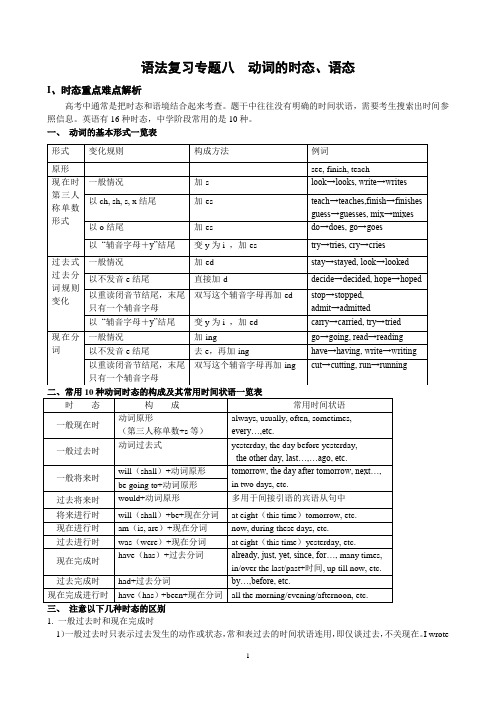
语法复习专题八动词的时态、语态I、时态重点难点解析高考中通常是把时态和语境结合起来考查。
题干中往往没有明确的时间状语,需要考生搜索出时间参照信息。
英语有16种时态,中学阶段常用的是10种。
一、动词的基本形式一览表1. 一般过去时和现在完成时1)一般过去时只表示过去发生的动作或状态,常和表过去的时间状语连用,即仅谈过去,不关现在。
I wrotea letter this morning. (只说明写了一封信的事实)2)现在完成时表示过去发生的动作或状态,但和现在有联系,可能刚结束,也可能继续下去。
不能和表过去的时间状语连用,译成汉语时可加“已经”。
I have written a letter this morning. (我已经写了一封信,有继续写第二封的可能,现在还是早上。
)2. 一般过去时和过去进行时1)一般过去时侧重于说明发生某动作的事实。
It rained heavily last night.昨晚雨下得很大。
(强调下雨,并不强调持续时间)2)过去进行时侧重于强调某动作的持续过程或表示动作在进行。
It was raining cats and dogs last night昨晚整整一夜都在下倾盆大雨。
(强调没停,一直持续)3. 现在完成时和现在完成进行时1) 现在完成时在含义上着重表示动作的结果。
I have read that book. (已读完)2)现在完成进行时着重表示动作一直在进行,即动作的延续性。
I have been reading that book all the morning.( 还没读完)注:It is/was +时间段since从句(从句的谓语动词如果是持续性动词:表示自从某人不做某事已多久了:It is/was +时间段since从句(从句的谓语动词如果是短暂性动词:表示自从某人做某事以来已多久了:Eg: It is ten years since he came here. 他来这儿已10年了。

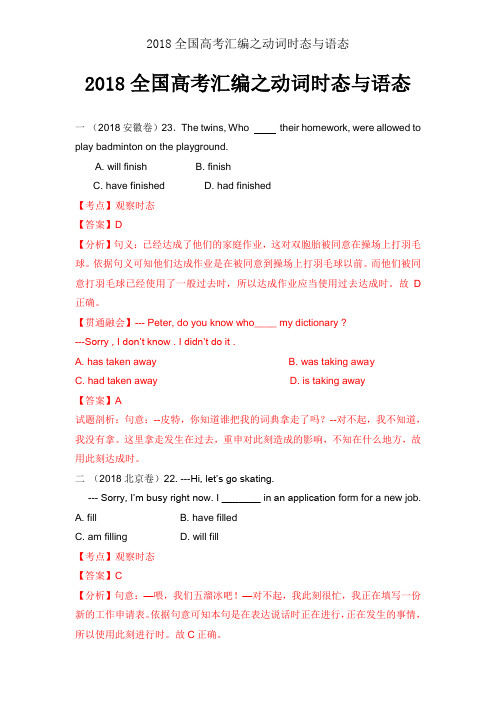
2018全国高考汇编之动词时态与语态一(2018安徽卷)23.The twins, Who their homework, were allowed to play badminton on the playground.A. will finishB. finishC. have finishedD. had finished【考点】观察时态【答案】D【分析】句义:已经达成了他们的家庭作业,这对双胞胎被同意在操场上打羽毛球。
依据句义可知他们达成作业是在被同意到操场上打羽毛球以前。
而他们被同意打羽毛球已经使用了一般过去时,所以达成作业应当使用过去达成时。
故D 正确。
【贯通融会】--- Peter, do you know who____ my dictionary ?---Sorry , I don’t know . I didn’t do it .A. has taken awayB. was taking awayC. had taken awayD. is taking away【答案】A试题剖析:句意:--皮特,你知道谁把我的词典拿走了吗?--对不起,我不知道,我没有拿。
这里拿走发生在过去,重申对此刻造成的影响,不知在什么地方,故用此刻达成时。
二(2018北京卷)22. ---Hi, let’s go skating.--- Sorry, I’m busy right now. I _______ in an application form for a new job.A. fillB. have filledC. am fillingD. will fill【考点】观察时态【答案】C【分析】句意:—喂,我们五溜冰吧!—对不起,我此刻很忙,我正在填写一份新的工作申请表。
依据句意可知本句是在表达说话时正在进行,正在发生的事情,所以使用此刻进行时。
故C正确。
【试题延长】时态题的观察重点是抓住句子的上下文含义和句中的时间状语。


2018年高考及最新模拟分类汇编之动词的时态和语态及情态动词2018年高考动词的时态和语态及情态动词1. 【2018 北京】1. —Hi, I ' m Peter. Are you new here? I haven ' t seen you around?—Hello, Peter. I ' m Bob. I just on Monday.A. startB. have startedC. startedD. had started【答案】C【解析】考查时态。
句意:一一嗨,我是彼得。
你是新来的吗?我没有在附近见过你。
一一你好,彼得。
我是鲍勃。
我周一刚刚开始住在这儿。
根据两人谈话内容可知,Bob现在在这儿,他开始(start)住在这儿是发生在周一的事情,周一是一个过去的时间,故该句应用一般过去时态,C选项正确。
点睛:一般过去时表示过去某个时间里发生的动作或状态或过去习惯性、经常性的动作、行为。
一般过去时常与表示过去的时间状语或从句连用,女口:yesterday, last week, in the past,in 2017 , once, a few days ago 等。
2. 【2018 北京】4. Susan had quit her well-paid job and _________ a s a volunteer in then eighborhood whe n I visited her last year.D. had workedA. is work ingB. was work ingC. has worked【答案】B点睛:过去进行时表示在过去某一时间段或某一段时间内正在发生或进行的动作或状态。
3. 【2018 北京】7. China ' s-hpeed railways __________ from 9,000 to 25,000 kilometers in thepast few years.A. are grow ingB. have grow nC. will growD. had grow n【答案】B【解析】考查时态。

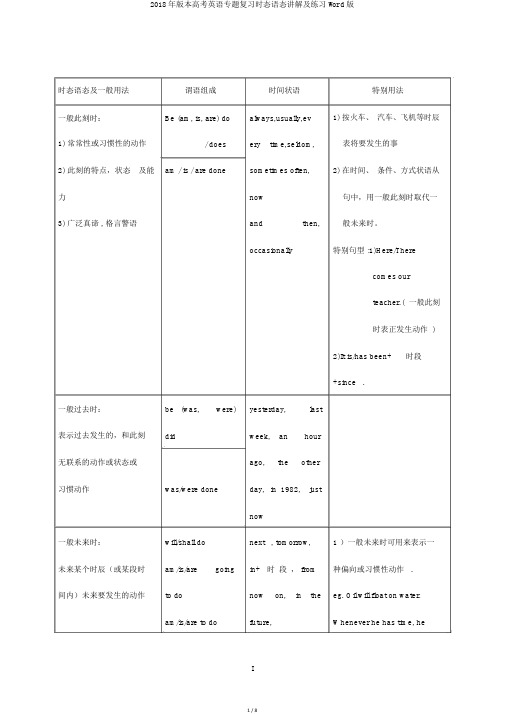
时态语态及一般用法谓语组成时间状语特别用法一般此刻时:Be (am, is, are) do always,usually,ev 1) 按火车、汽车、飞机等时辰1) 常常性或习惯性的动作/ does ery time,seldom, 表将要发生的事2) 此刻的特点,状态及能am / is / are done sometimes often, 2) 在时间、条件、方式状语从力now 句中,用一般此刻时取代一3) 广泛真谛 , 格言警语and then, 般未来时。
occasionally 特别句型 :1)Here/Therecomes ourteacher.( 一般此刻时表正发生动作 )2)It is/has been+ 时段+since .一般过去时:be (was, were) yesterday, last表示过去发生的,和此刻did week, an hour无联系的动作或状态或ago, the other习惯动作was/were done day, in 1982, justnow一般未来时:will/shall do next , tomorrow, 1 )一般未来时可用来表示一未来某个时辰(或某段时am/is/are going in+ 时段, from 种偏向或习惯性动作 .间内)未来要发生的动作to do now on, in the eg. Oil will float on water.am/is/are to do future, Whenever he has time, heam/is/ are about to dowill/shall be done would/should be donewas/were going to be done will come.其否认式表示“ 不可以没法”The machine won’ t work.( 机器无法开动)2 )Cf:be going to表示说话前已经作出的主观的打算或计划,或用来表达有某种迹象要发生的事will do 表示讲话时暂时决定的企图,拥有暂时性和有时性be to do 表示商定、计划或职责、义务要求马上发生的动作。
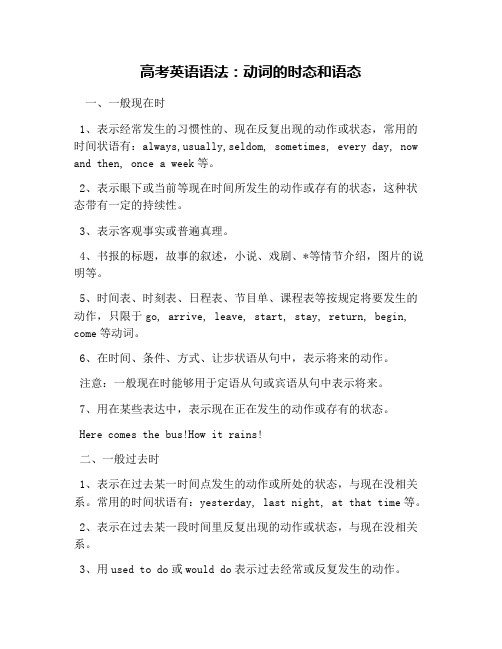
高考英语语法:动词的时态和语态一、一般现在时1、表示经常发生的习惯性的、现在反复出现的动作或状态,常用的时间状语有:always,usually,seldom, sometimes, every day, now and then, once a week等。
2、表示眼下或当前等现在时间所发生的动作或存有的状态,这种状态带有一定的持续性。
3、表示客观事实或普遍真理。
4、书报的标题,故事的叙述,小说、戏剧、*等情节介绍,图片的说明等。
5、时间表、时刻表、日程表、节目单、课程表等按规定将要发生的动作,只限于go, arrive, leave, start, stay, return, begin, come等动词。
6、在时间、条件、方式、让步状语从句中,表示将来的动作。
注意:一般现在时能够用于定语从句或宾语从句中表示将来。
7、用在某些表达中,表示现在正在发生的动作或存有的状态。
Here comes the bus!How it rains!二、一般过去时1、表示在过去某一时间点发生的动作或所处的状态,与现在没相关系。
常用的时间状语有:yesterday, last night, at that time等。
2、表示在过去某一段时间里反复出现的动作或状态,与现在没相关系。
3、用used to do或would do表示过去经常或反复发生的动作。
4、有些情况发生的时间没清楚表明,但实际上是“刚才,刚刚”发生的,属于过去时间,应使用过去时态。
常见的有I didn’t know…或I forgot…等。
5、一般过去时可与today, this week, this month等时间状语连用。
三、一般将来时1、will/shall do(1)表示将来会出现的动作或状态。
常用的时间状语:this evening, tomorrow, next week/month…,at the end of this term, in a few minutes等。


语法复习八:动词时态和语态(1)一、动词的分类和形式:动词是表示动作和状态的词。
动词有时态、语态和语气3种形式的变化。
1、动词按其能否独立作谓语而分为:“谓语动词”和“非谓语动词”两种2、动词的4种基本形式:动词原形、过去式、过去分词和现在分词。
3、动词按其构成动词词组作用分为:实义动词、连系动词、情态动词和助动词。
1)实义动词分为及物动词和不及物动词。
还可分为持续性动词和瞬间动词;2)连系动词有两种:一种表特征或状态,另一种表状态变化过程。
4、五种不同的短语动词:1)“动词+介词”;2)“动词+副词”;3)“动词+副词+介词”;4)“动词+名词(或代词)+介词”;5)“be+形容词(包括相当于形容词的过去分词+介词”。
二、动词的时态:1、一般现在时的用法:1)表示现在的习惯,经常发生的动作或存在的状态。
2)表示主语的特征、性格和能力。
3)表示客观事实或真理。
4)表示按照计划安排好的将来行为。
(只限于是go,come, leave, start, stop, be等开始或移动意义的词。
)2、一般过去时的用法:1)表示过去的动作或状态。
2)叙述过去连续发生的事情。
3)表示过去一段时间内经常发生的动作。
3、一般将来时的用法:1)表示将来的动作或状态。
2)表示将来的经常动作。
4、现在进行时的用法:1)表示说话时正在进行的动作。
2)表示现阶段正在进行的动作。
(说话时动作不一定进行。
)5、过去进行进的用法:1)过去某一时刻或某一段时间内正在进行的动作。
2)表示移动的动词:come, start, stay, leave, go等词的过去进行时可以表示过去的将来要发生的动作。
3)was going to do可以表示在过去某一时间之后发生的动作。
6、现在完成时的用法:1)表示刚刚完成的动作,常与just连用。
2)表示过去发生而持续到现在的动作或状态,甚至延续到将来。
常与since, for连用,但for, since不能与终止性的动词连用。
3)表示过去的动作对现在造成的影响或结果。
7、现在完成时与一般过去时的区别:1)现在完成时与现在有联系,它表示过去的动作对现在所产生的结果、影响。
一般过去时通常表示在过去某一具体时间发生的动作,与现在没什么联系。
2)现在完成时表示过去延续到现在的行为;一般过去时着重过去某一时刻的某一具体动作。
8、过去完成的用法:1)表示在过去某一或动作之前已经完成的动作。
常与by, before等介词短语或一个状语从句或上下文暗示。
2)表示由过去某一时间开始,一直延续到过去另一时间的动作,常和for(有时可省去)或since 构成的短语或since引导的从句连用。
9、过去将来时的用法:表示对于过去某一时刻而言将要发生的动作或存在的状态。
练习一:动词时态与语态(1)1. When I saw Mary, she ______ on the piano.A. is playingB. playsC. was playingD. played2. She ______ the door before she goes away.A. had lockedB. is lockingC. has locked.D. was locking.3. A hunter is a man who ______ animals.A. catchB. catchesC. will catchD. was catching4. What _____ if I drink this?A. happensB. is happeningC. will happenD. is happened5. I will visit you if Father ______ me.A. letB. letsC. is lettingD. will let6. Look out! That tree _____ fall down.A. is going toB. will beC. shallD. would7. My uncle _____ to see me. He'll be here soon.A. comesB. is comingC. had comeD. came8. They can't leave until they _____ their work.A. didB. are doingC. have doneD. has done9. "Has he seen this film?" " Yes. He ______ it several days ago. "A. sawB. has seenC. had seenD. was seeing10. Now Mike isn't here. He ______ Mr Green's. Perhaps he ______ back in a few minutes.A. went to; is comingB. has gone to; will comeC. has been to; will beD. is going to; has come11. That day he ._______ his clothes before he came to see me.A. has washedB. washedC. had been washingD. was washed12. I haven't finished my composition. I ______ for two hours and a half.A. have written itB. have been writing itC. wrote itD. am writting it13. I will take my daughter with me when I _____ ShangHai,A. go toB. will go toC. have been toD. have gone to14. This bright girl ______ the truth in front of the enemy.A. didn't sayB. couldn't speak toC. saidD. didn't tell15. The bridge which ______ last year looks really beautiful.A. was builtB. builtC. was set upD. had been built16. " When ______ school begin?" " Next Monday. "A. hasB. doesC. didD. is going to17. I will ______ here till you give me some money.A. leaveB. not leaveC. comeD. return18. I _____ here since I moved here.A. will workB. workedC. workD. have been working19. Every time I _____ there, I will buy him something nice.A. wentB. will goC. goD. have gone20. It was said that his father ______.A. has diedB. died.C. has been deadD. had died21. We won't go unless you ______ soon.A. had comeB. cameC. will comeD. come22._____six years since I began studying English.A. They have beenB. it isC. It wasD. There are23. They ______ the Summer Palace three times.A. have gone toB. have been toC. have been inD. have gone into24. "How long haven't we seen each other? ""Well, it _____ nearly two years since we ______ last. "A. is/have metB. was/had metC. is/metD. has been/had met25. "Have you seen the art exhibition?" "No, _____ there. "A. it was not being heldB. they didn't holdC. it had not heldD. they were holding it26. Don't get off the bus until it ______.A. stopB. will stopC. stoppedD. has stopped27. "Where ______ the recorder? I can't see it anywhere." "I _____ it right here. But now it's gone. "A. did you put/have putB. have you put/putC. had you put/was puttingD. were you putting/have put28. They asked me to have a drink with them. I said that it was 10 years since I ______ a good drink.A. had enjoyedB. was enjoyingC. enjoyedD. had been enjoying29. Don't come tonight. I would rather you _____ tomorrow.A. comeB. cameC. will comeD. coming30. ______ you ______?A. Do/marryB. Have/marriedC. Have/been marriedD. Are/married31. When he ______ all the newspapers, he'll go home.A. sellsB. has soldC. will have soldD. will be sold32. "This cloth _____well and _____ long. ""Ok. I'll take it. "A. washes/lastsB. is washed/lastedC. washes/is lastedD. is washing/lasting33. "Hurry up, you ______ on the phone. " "Oh, I'm coming. Thank you. "A. are wantedB. are being wantedC. wantD. are wanting34. I ______ see you, but I didn't, for I had no time.A. had wanted toB. has wanted toC. wantedD. was wanted35. I ______ in Guang Zhou for six years by this October.A. have livedB. was livingC. will be livingD. shall have lived36. By this time next year he ______ from the college.A. will be graduatingB. should be graduatingC. will have graduatedD. is graduating37. Our teacher told us that the earth _____ from west to east.A. turnsB. turnC. has turnedD. had turned38. My brother _____ while he _____ his bicycle and hurt himself.A. fell/was ridingB. fell/were ridingC. had fallen/rodeD. had fallen/was riding39. Bill said he ____ twenty-one the next year.A. was going to beB. was about to beC. could beD. was to be40. It is high time you _____ in bed now.A. areB. wereC. will beD. would be41. After a while an agreement _____.A. was arrived atB. was arrived inC. was arrivedD. has been arrived42. The air liner from Beijing _____ at 3:00 p.m.A. is about to arriveB. has arrivedC. arrivesD. is going to arrive43.______,that step is not safe!A. Look aroundB. Look upC. Look outD. Look down44. "Have you _____ him to give up smoking?" "No. I _____, but he wouldn't listen."A. persuaded/triedB. tried/persuadedC. tried/triedD. persuaded/persuaded45. The research laboratory is going to ______ the new type of computer to use.A. takeB. makeC. putD. send46. I don't know when he ______, but when he ______, I'll let you know.A. will come/comesB. comes/will comeC. comes/comesD. will come/will come47. How much do you think that vase _____?A. is costB. usedC. was paid forD. cost48. I _____ that he would be able to leave tomorrow, but it's beginning to look diffcult.A. hopeB. had hopedC. hopedD. am hoping49. “Come on, Peter, I want to show you something.”“Oh, how nice of you, I _____ you _____ to bring me a gift.”A. never think/are goingB. never thought/ were goingC. didn’t think/ are goingD. hadn’t thought/ were going50. It’s a nice flat, but it _____ a proper bathroom.A. haven’t gotB. hasn’t gotC. wouldn’t getD. doesn’t have got51. She had a shock when she heard the news, _____?A. hadn’t sheB. didn’t sheC. wouldn’t sheD. won’t she52. This liquid _____ the salt at room temperature.A. became mixed withB. was mixed byC. mixes withD. has been mixing by动词时态和语态(2)一、时态的呼应:在复合句,从句(主要是宾语从句)中的时态,常受主句谓语动词的影响,这就叫做时态的呼应,时态的呼应一般有如下的情况。